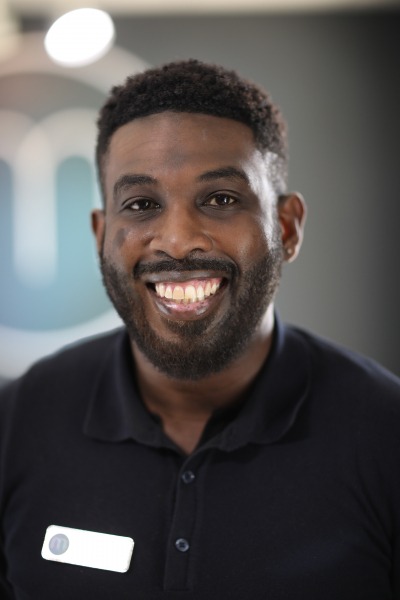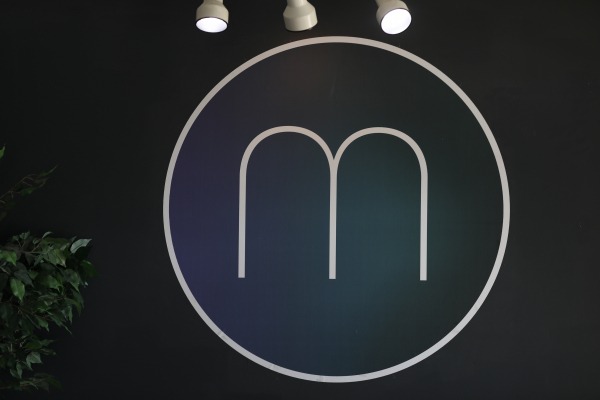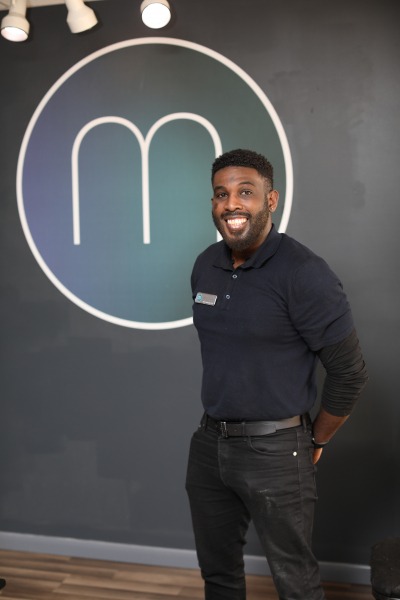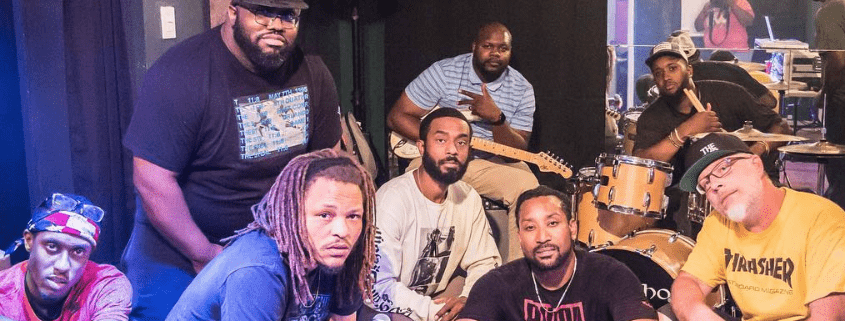Sit Down with Success: Mario Maitland – Work ‘Plan A’ Until the Wheels Fall Off
“Sitdown with Success” highlights local entrepreneurs and their accomplishments. This month’s feature is Mario Maitland, founder of the Maitland Conservatory and the Maitland Arts Initiative.

Mario Maitland: ,”I quit my job and went all in. I knew if I wanted to grow it, I had to be fulltime.” (Photo/Steve Babin)
Mario Maitland’s journey began in the 4th grade when a man with a violin showed up at his school offering violin lessons. Mario was captivated by the instrument and would go on to become an accomplished classical concert pianist. While in college, he answered a billboard post to try out for the Rome International Music Festival and Piano Competition. He earned a three-week trip to Rome, Italy where he was one of the youngest pianists to play with the Rome Festival Orchestra.
With a passion for education and music, Mario is on the City’s Music Initiatives Board. In 2012, he invested everything he had to start the Maitland Conservatory. The project’s goal was not just to teach anyone how to play musical instruments, but also what he calls “modern arts training” that can lead to careers in the music industry.
Where did the idea of starting Maitland Conservatory come from?
One of the things that catapulted me into starting the Conservatory happened when I was in graduate school at Tennessee State working on my master’s degree in music education. In my research, I discovered a lot of people are interested in the arts and a music education. However, most people don’t know what they can do with a music degree beyond things like playing piano in church or being a high school band teacher.
Maitland Conservatory focuses on the modern careers that can be created from the arts like music production, film scoring, deejaying, video editing, even vlogging and podcasting.
Was it difficult starting a music school?
I wrote the business plan in 2006 for something called the Maitland School of the Arts.
I was giving private lessons at my church but like a lot of entrepreneurs, my dream wasn’t coming to fruition quickly enough and I was getting discouraged.
 A pastor friend encouraged me not to give up. He said that until you know what you are supposed to be doing, do what you know how to do. and you will discover it.
A pastor friend encouraged me not to give up. He said that until you know what you are supposed to be doing, do what you know how to do. and you will discover it.
That was profound to me and yet simple.
I started digging into how to start a school, how to write curricula, and I started putting together the books to use. One of the first books I wrote was The Well Versed Music Producer, which is the workbook and manual we use for teaching music production at the conservatory.
By 2012, I was about to not only give up but move to Nashville. I drove past our current build every day but that day, I saw a sign, Space For Lease. They showed me around and I was thinking, ‘How am I going to do this? I have never run a business before, the lease will require $2,000 down plus utilities and rent!’ … but I just decided to do it, took my check from my church job, and went for it.
How did you pull it off?
I opened my doors in 2012 with seven to 10 students I had been teaching privately from Union Hill.
We had a little benefit concert to try and raise some money to help pay the rent. We made about $700. Anyone in business knows $700 is $700 you didn’t have before. However, when you consider paying employees, rent and utilities … it’s not a lot.
I began investing all my money from church to renovate the building, which was formerly a doctor’s office with sinks in every room, baby blue walls and white linoleum. Every time I got paid at church, I spent it on paint, flooring, or whatever.
When I wasn’t at church, I was at the building. I was also newly married with a baby.
I was growing it from grassroots. I had no loans, no investors. We paid for everything based on sales – the students we brought in, and I used high school volunteers to answer phones. I was not paying myself anything.
It was stressful.
When did you know it was going to be okay and that you were going to make it?
In 2015, I quit my job and went all in. I knew if I wanted to grow it, I had to be fulltime.
But I attended a college graduation for one of our students and the guest speaker asked the graduates, ‘How many of you have a Plan B?’
Of course, a lot of them raised their hands.
He said, ‘If you have a Plan B, you will fail.’
I immediately eliminated my Plan B. Then all I had was Plan A and I knew I had to work it until the wheels fall off. I have a wife and child and a business with my name on it. I have no choice but to make it work!
But all that said – the fact we survived 2020 and the COVID pandemic, I have been surer than ever. We actually grew last year, and yet we lost a lot. We lost all of our school contracts. I think probably they will come back so I choose to think of them as postponed. We lost students for financial reasons, but I think eventually they will come back.
And that was a piece of why I started the Maitland Arts Initiative. I hope to tackle some of the financial issues that keep students from being able to afford a music education.
How did the project survive COVID?
Our whole model is technology and innovation. Before COVID, we used a studio management software called My Music Staff that let us do a lot of things online. We did not have virtual lessons yet, but with a portal online, students could see homework and communicate through our branded software portal.
We were going to try Zoom classes, but we got lucky. My Music Staff integrated with Zoom so we could now offer through the student portal, 1-click access into our virtual lessons.
What advice would offer anyone starting their own business?
You have to decide how much you are willing to sacrifice when you start a new business.
You also have to develop a managerial and operational mindset and that does not always come natural to musicians.
For instance, when COVID first hit and we lost a student, someone said to me, ‘Well, it’s just $100 a month, that’s not so bad.’
And I said, ‘No. It is $1,200 a year and that is significant.’
What are the hardest challenges you had to overcome?
Mountains of paperwork you don’t know you need like permits and a Tax ID number when you open a business bank account.
I wanted a sign out in front of my building, so I had a banner made and put it up on the street. Did you know there is someone who rides around town just watching for signage infractions? I didn’t know I needed a permit to put a sign out, but he wrote me a ticket for it.
And you have to figure out what your cost is to hire help versus what you are charging for your products and services.
In the beginning, my focus was making everything affordable to get as many students as possible, but you have to weigh the costs to make sure you don’t lose money when all your expenses like employee salaries, utilities, and rent are paid. I never thought about it in terms of net profit versus gross profit.
What did you do before starting the Conservatory?
I worked as the minister of worship for Union Hill PB Church for 14 years and I was over 12 ministries under the church administration, so I had a lot of managerial and administrative experience that became very helpful after I got Maitland Conservatory going.
You are a very accomplished classical concert pianist, aren’t you?
I got a lot of support from my parents who saw a glimmer of talent in me when I took violin lessons in 4th grade. They said, if you are going to do it, do it right, so they took me to the Ann Clark School of Music in Augusta, Ga. and signed me up for private piano lessons.
That led to my applying to the John F. Davidson Fine Arts School where I attended from 6th through 12th grade. The mindset at the school was to always be looking for the next opportunity, so whenever there was a competition happening somewhere, I applied.

Mario Maitland: “… my focus was making everything affordable to get as many students as possible, but you have to weigh the costs to make sure you don’t lose money.” (Photo/Steve Babin)
What makes Maitland Conservatory different?
I spent time as the music director for urban Christian artist, Sean Simmonds, putting his music together on tour, working with bands, and producing music for his album and other artists while writing music for film and television.
I was reflecting on how I was using my tradition arts education to apply it to modern use and create a career out of it.
By 2004, a lot of colleges started catching up to this idea of adding recording arts programs and music production programs to their curricula and I saw that trend starting to happen.
But I wondered, why are we only seeing these programs on a collegiate level? It didn’t make sense. It was like saying I want to major in piano, but you have never played the piano until you went to college.
There are a lot of places where you can go to take piano, drum or voice lessons, but they do not teach you how to put those skills to modern use like playing by ear, learning the national number system, writing songs and producing songs, etcetera.
You started a nonprofit arm last year too, didn’t you?
I always had a nonprofit mindset in that when we started the Arts and Technology Club at Jemison High School. The school didn’t have any money to pay us, but we saw a need because of our collaboration with the North Alabama Arts Education Collaborative whom we worked with through Arts Huntsville; and the students wanted it, so we decided to give it to them. We ran that program for free and bought all the equipment.
The Industry summit in 2019 will be coming back next year. We brought people in the music industry to Huntsville for a free conference and free artist showcase. At the end of the day, we spent about $6,200 off our bottom line to make it free to the public because we see it as an investment with tremendous long-term benefits.
It will be part of the Huntsville Amphitheater at MidCity next year.
And we were recently able to offer scholarships through our Arts Initiative to provide instruments to two students.
One of my favorite authors, Dr. Myles Munroe says when he dies, he wants to die empty, and I have taken that as my mantra as well.








